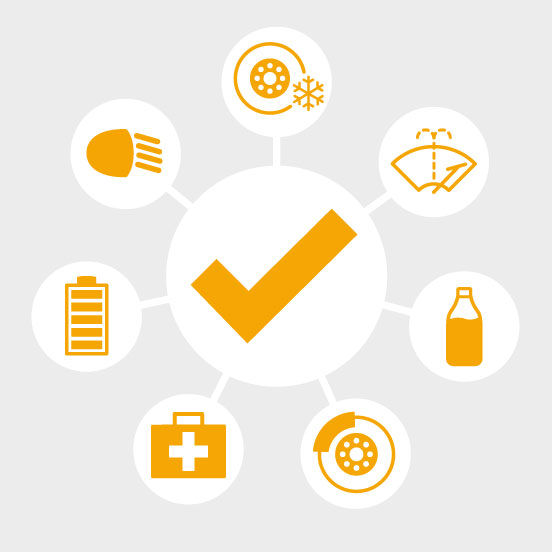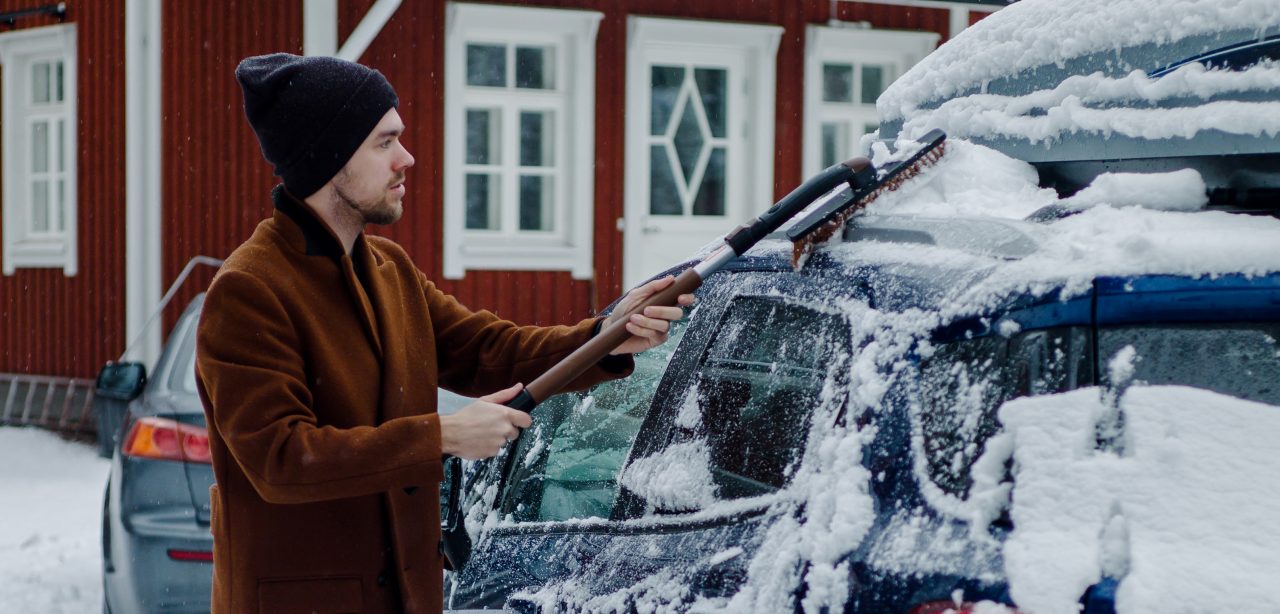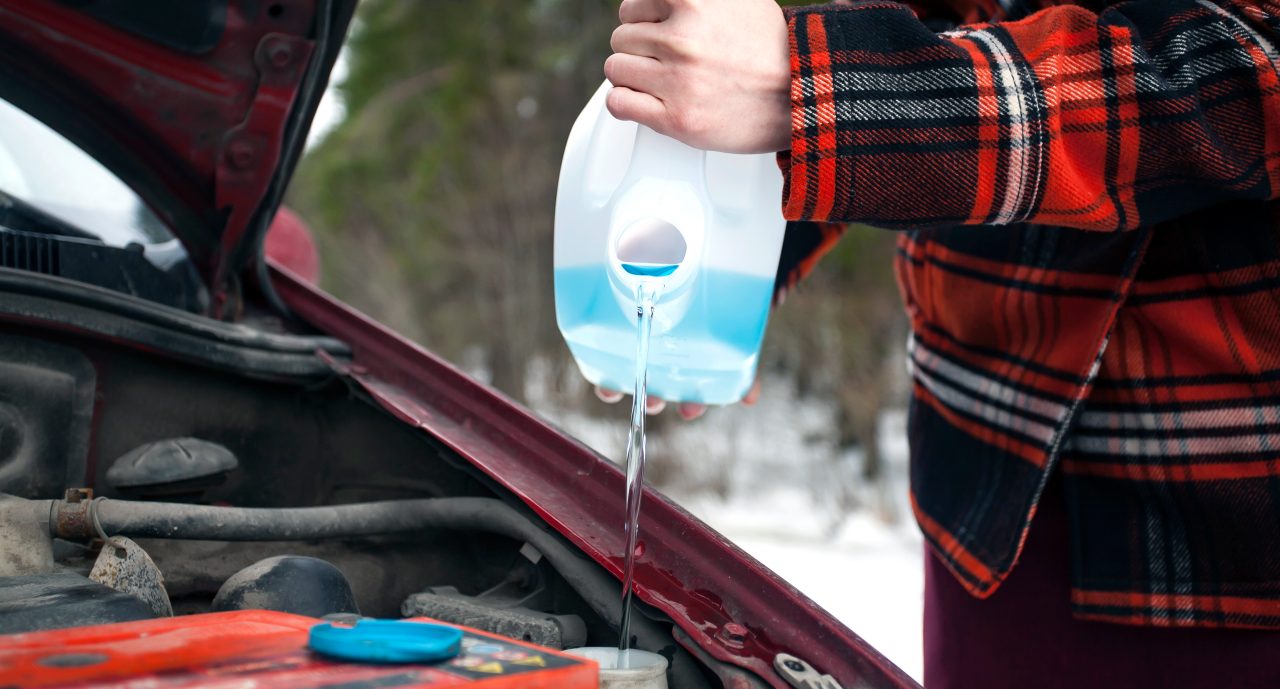
Visit Continental Tires in your country for local vehicle fitment
#WinterWorld
Winter car maintenance checklist
How to prepare your car for winter
As soon as cold weather comes around, you instinctively swap your wardrobe for warm coats, scarves and beanies. Preparing your car for winter weather should be no different. Now is the time to:
1. Fit your car with winter tires
2. Check the condition of your winter tires
3. Check your fluids
4. Check your battery
5. Check your lights
6. Check your wiper blades
7. Prepare a winter car kit

In addition to switching to winter tires, you should also prepare your car for snow, ice and freezing temperatures. A winter car kit will help you get through the season safely and comfortably.
To help you winterize your vehicle, follow our checklist of seasonal car care tips. Your car will be ready for winter driving in no time.

1.Fit your car with winter tires
Winter tires are one of the first things that spring to mind when preparing your car for winter – for good reason. They provide driving comfort and safety in the colder months of the year and most regions around Europe even make winter tires a mandatory requirement at particular times. It’s common practice to fit your winter tires around October, but you can find out where and when you have to swap your tires by law here.
Once the thermometer drops, the rubber on summer tires hardens and their grip is reduced. With winter tires, you’re prepared for harsh winter conditions such as freezing temperatures and icy roads. Learn more about the differences between winter and summer tires here. Depending on where you live, find out wheter all-season tires may be an alternative.
2.Check the condition of your winter tires
When having your winter tires fitted, make sure they’re in good condition – including the spare! To do this, check the tire tread and ensure the tire pressure is correct, and look for any unusual bulges, wear, or general damage. If you do spot anything, mention it to your tire expert. However, if a professional is fitting your winter tires for you, they’ll notice these things and recommend a repair or new tires.
3. Top up your fluids
When checking your vehicle's fluids, park your car on a flat level surface and ensure the engine is cold. Next, check the following fluids and be sure to use the correct ratio and don't exceed the maximum level line:
- Oil
- Windscreen wiper fluid, as your windscreen will get dirty more often in winter.
- Antifreeze, added to engine coolant water. As the name suggests, antifreeze will stop the water in the engine's cooling system from freezing.

4. Check your battery
If your car is taking longer to start than usual or if your car lights are dim, these may be signs that it’s time for a new battery. If you don’t have it checked, the cold weather could be its (and your) downfall. Visit your mechanic, who will advise you on whether you need a new battery or repairs.
5. Check your lights
Winter driving means encountering rain, sleet and snow in longer periods of darkness. Therefore, you’re going to be dependent on your lights quite often. You’ll also be in greater danger if they aren’t working. Before the harshness of winter arrives, ensure your headlights, fog lights, indicators, reversing lights and brake lights are all working. Once you know they’re in good condition, give them a thorough clean with window wash or for particular stubborn stains, rub in some toothpaste, let it rest a couple of minutes and wipe away.
6. Check your wiper blades
There’s nothing worse than the screeching sounds of old or broken wiper blades during a heavy downpour. If your wipers are failing to clear your windshield effectively, they need replacing. It’s easy to replace your wipers, as long as you make sure to purchase the correct blades. If in doubt, ask a garage assistant or speak to your local car dealer.
7. Prepare a winter car emergency kit
You may not need everything in this emergency kit checklist, but you'll be glad of the emergency items if you do find yourself stranded in the thick of winter:
Car tools
- Ice scraper
- Spare tire – check the air pressure at least once a month
- Flashlight
- Tow rope
- Jumper cables
- Small shovel
- Road salt
Communication
- Spare mobile phone charger
- Hazard warning triangle
- High visibility vest (mandatory in some countries)
- Whistle
Aid, warmth, and nourishment
- First-aid kit
- Power bars
- Drinking water
- Warm winter clothing, including socks, gloves, scarf and a hat
- Rain jacket or poncho
- Fleece blanket
- Warm, waterproof boots
Related content
-
 2025/10/27Tread is important in every season, but even more so when roads are slippery, cold and frozen, so check your winter tires!Tread on winter tiresRead more
2025/10/27Tread is important in every season, but even more so when roads are slippery, cold and frozen, so check your winter tires!Tread on winter tiresRead more -
 2024/10/17Learn how to look after your tire pressure during cold winter monthsTire pressure in winterRead more
2024/10/17Learn how to look after your tire pressure during cold winter monthsTire pressure in winterRead more -
 2024/10/17Enjoy winter, regardless of the weather – and arrive safely at your destination, regardless of the driving conditions.Continental Winter WorldRead more
2024/10/17Enjoy winter, regardless of the weather – and arrive safely at your destination, regardless of the driving conditions.Continental Winter WorldRead more